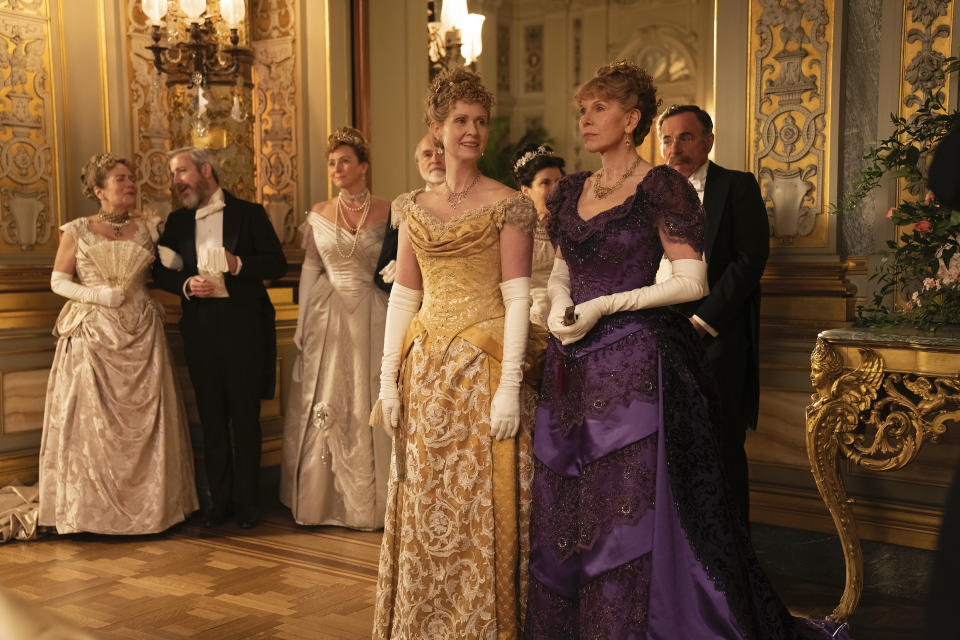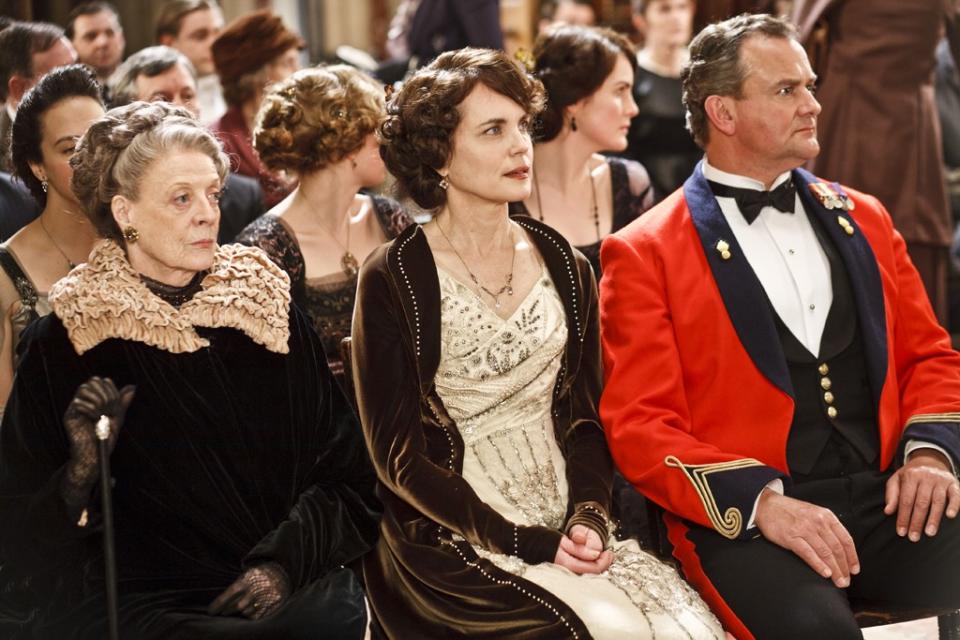Julian Fellowes Talks ‘The Gilded Age,’ Upcoming ‘Downton’

“If people watch a show I’ve written, have had a great evening and have enjoyed it, that’s enough for me,” says Julian Fellowes — he of “Downton Abbey” and what could be considered its American twin, the new HBO series “The Gilded Age.” “I hope every now and then I give them something to think about that is a little out-of-the-ordinary, or I slightly challenge a prejudice and make them re-examine that prejudice. If you’ve done that, you’ve done something worthwhile.”
The grandeur splashed throughout “The Gilded Age” series is undeniable, but the ever-striving characters’ struggles and flaws can be just as glaring — just as they were in “Downton Abbey.” The new series, set in New York City in 1882, highlights the clashes between the Old Guard and enterprising new arrivals with undercurrents of greed, capitalism, social climbing and racial and social inequities.
More from WWD
Here, in a Zoom interview, Fellowes, who created, executive produced and co-wrote the series, discusses his career, the promise of America and his next release, ”Downton Abbey: A New Era.”
WWD: Why did you feel the diversity narrative was essential in “The Gilded Age?”
Julian Fellowes: I wanted to show that this was very much not an English period story. At that time, the great difference between America and Great Britain was the very large Black community in America. There wasn’t one in Britain. That was essentially a post-Second World War phenomenon. We were only 14 years after the ending of the Civil War and the freeing of the slaves in the South. To have no Black story at all in that period seemed rather dishonest in a way.
WWD: Are we living in a second Gilded Age?
J.F.: There are parallels. As we were filming, [Jeff] Bezos and Richard [Branson] had their rocket race to the moon. It did strike me as a very Gilded Age kind of activity. We do have these enormous fortunes. We have a lot more taxation and this extraordinary disparity of income. There is a use for people, who have a lot of money. They can keep things going, they can look after things that might otherwise die out. I don’t just mean good causes by crafts, arts and different skills that you need patrons to keep going. I don’t want to come down on that. There is a great income disparity in America and Europe that strikes a note with the Gilded Age.
WWD: Is the show’s keeping-up-appearances theme meant to mirror the Instagram era?
J.F.: I don’t do Instagram or any of those things. With Instagram, you’re always presenting, “This is my mah-velous life. Here, I am looking mah-velous living it. These are my mah-velous clothes and this is my mah-velous holiday. And just look at this cocktail.” All of that is a very Gilded Age way of carrying on. It’s worth remembering that when Mark Twain christened it, he didn’t call it the Golden Age. He called it the Gilded Age. It was all about appearances…we’re always being told that teenage girls are incredibly depressed because everyone on the internet has the figure of a film star and the wardrobe of one as well. Really, it’s a kind of dishonesty. You’re trying to present yourself all the time as a success story. I probably shouldn’t say this, but it is kind of an American quality. When Americans talk about themselves to people that they don’t particularly know, everything is going swimmingly.

Alison Cohen Rosa/Courtesy of Courtesy of HBO
WWD: In “The Gilded Age,” you show the evils of greed, capitalism and the ramifications — are you trying to debunk how we view wealth?
J.F.: I wouldn’t say debunk. I’m more of a chronicler than a moralist. I like people to think of these things. I don’t really bang them over the head with them. I like people to think that whatever they are going through, more or less everyone is going through some version of that in their own lives — whoever they are. I suppose that is the central tenet of whatever I write or produce.
WWD: How involved are you with the costuming?
J.F.: Kasia [Walicka-Maimone] is a genius. You have a character meeting with costume and design to make sure you’re on the same page and to understand not just their social class, background and nationality but also they are very anxious, desperate to please and confident. All those things affect clothing and the rest of it. We’re very lucky with [production designer] Bob [Shaw] because they’re very experienced. They understand there is a narrative element in costume and design.

Courtesy of HBO/ALISON COHEN ROSA
WWD: What jumps out from “The Gilded Age’s” production?
J.F.: Newport was my greatest discovery. I knew about the cottages [seaside Gilded Age mansions] of course, but I had never been. I really loved it. It was an American Versailles of these palaces on every corner. It was so mad, but lovely and well worth the trip. You don’t have to go to Newport. If you go to the University Club [in Manhattan] or to the Frick Collection, you see that they thought they were giants.
WWD: Did Gilded Age women have CEO-level skills?
J.F.: That’s absolutely true. Even in their own times, some of these women got bored with it all being about balls, dinners and arranging wonderful matches for their children. Alva Vanderbilt, who was the greatest perpetrator of that, faked a heart attack to get her daughter to go down the aisle with the Duke of Marlborough. She spent the last chunk of her life on women’s suffrage and women’s rights. She led a procession down Fifth Avenue. Today Alva Vanderbilt would be running Shell or something.
WWD: What is the most significant way streaming is changing entertainment?
J.F.: We’re in a transition. I don’t pretend to understand it. All I feel that I can do is try to make a TV show, a movie, a musical or whatever it is I’m doing as good as I can get it. I don’t have a more complicated motive than that. I try to make things I want to see. The actual science of streaming and getting people to join these things is rather extraordinary. You try to get shows talked about and become the conversation. It obviously works. I mean I got Netflix to watch “The Crown…” You never seem to undo them. You sign up but you never sign off. I suppose that’s what they live on.
WWD: What have you seen that you’ve liked recently?
J.F.: I liked “Belfast.” I can remember the Troubles in Northern Ireland very clearly. I remember bombs in Harrods and people arriving at the house covered in glass. What I loved about [Kenneth] Branagh’s take was that he shows what it was like at that time for an ordinary family in the middle of all this mayhem. To a great extent, an ordinary family, no matter what’s going on around them, just gets on with it.
WWD: What were some of the more memorable moments of shooting the second “Downton Abbey” film?
J.F.: There was something rather extraordinary about the club reassembling. There we were in the Great Hall again. The actors were 10 years older than they had been, when we cast them. Of course, in that time, the young ones particularly, have built careers. They are all pretty famous around the world now. That was pretty moving to me. In a way, I thought, “I’ve done this by imagining these people. We’ve found these actresses and actors to play them. By doing that, we’ve altered the course of their lives.” That seemed rather enormous.

Nick Briggs/Carnival Film & Television Ltd.
WWD: Why does “Downton” resonate with so many people?
J.F.: They’ve been dealt different cards in life and are for the most part, they are trying to live decently and do their best. That was as true of “Daisy” the kitchen maid, as it was of “Lord Grantham.”
WWD: How does the Gilded Age compare to the “Downton Abbey” years in England?
J.F.: Long before I thought it was going to be on television, I was reading about Alva Vanderbilt, J.P. Morgan, Andrew Carnegie, Jay Gould and all these people. I got interested in this extraordinary Technicolor world that followed the Civil War, when in a way America established being American as a different way of life from any other country on the planet. They were limbering up for the century they would dominate — the 20th century. It was a very invigorating society. These people could arrive in New York and crash in, build their palaces and all the rest of it…in London, Paris and Rome, there was no blending of the old and the new. The new were expected to wait a couple of generations…if you had potential in the Gilded Age, in America, there was an opportunity to express your potential and make it take you somewhere.
WWD: Does that still exist today?
J.F.: It is pretty fundamental to the American way of life. All over the world we’ve been sidetracked by the pandemic, the culture wars and all of this stuff, and this extraordinary systemic virtue signaling that everyone goes in for now…Living in a society that doesn’t want to listen to anyone isn’t a very healthy place to be. When that calms down, you will see fundamental qualities of different societies and civilizations coming through again. America has always had this dynamic energy — this ability to say yes, looking for reasons to say yes rather than no. I never would have been taken seriously as a screenwriter without an American. Bob Altman decided I was what he was looking for [for “Gosford Park”].
WWD: Have you bought a wedding present for Michelle Dockery yet?
J.F.: I saw Michelle this week because Elizabeth McGovern is doing a play about Ava Gardner. A lot of the “Downton” club was there. I had congratulated Michelle, but I was able to do it in person and to meet Jasper [Waller-Bridge]. I’m really pleased that she is having another go at happiness, because she had this real tragedy earlier in her life. He seems charming.
Best of WWD
Sign up for WWD's Newsletter. For the latest news, follow us on Twitter, Facebook, and Instagram.
Solve the daily Crossword

